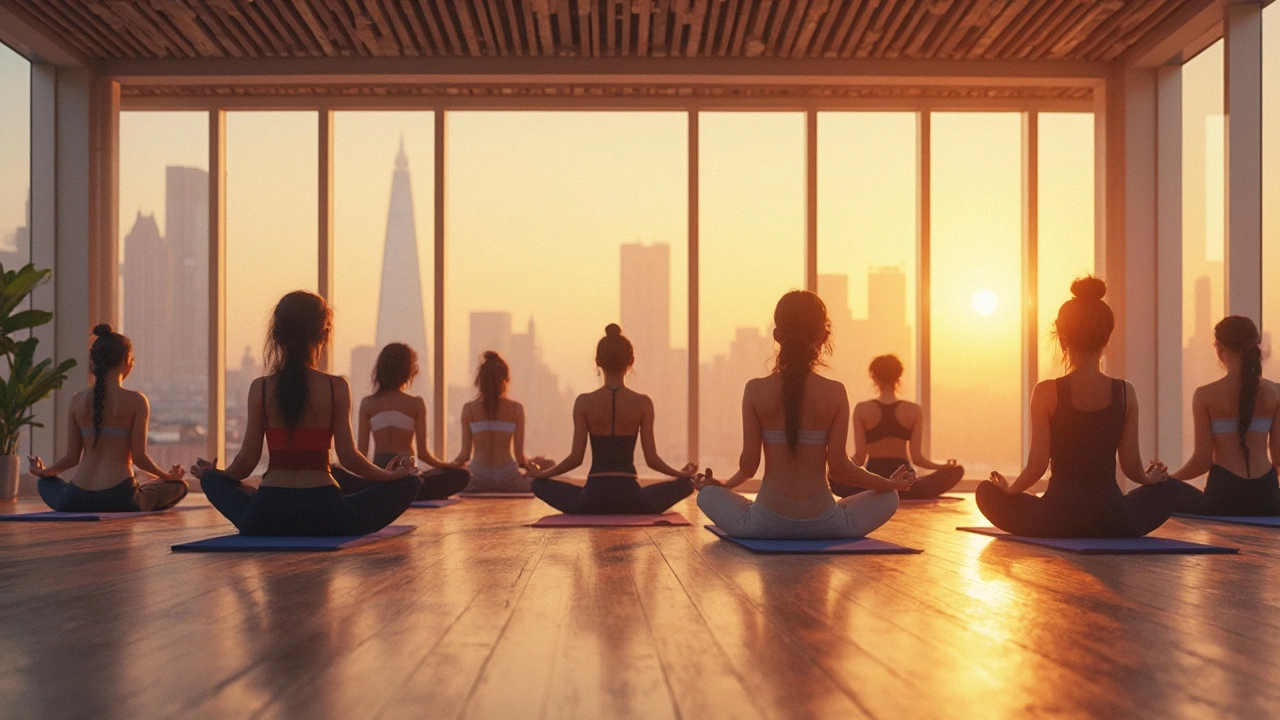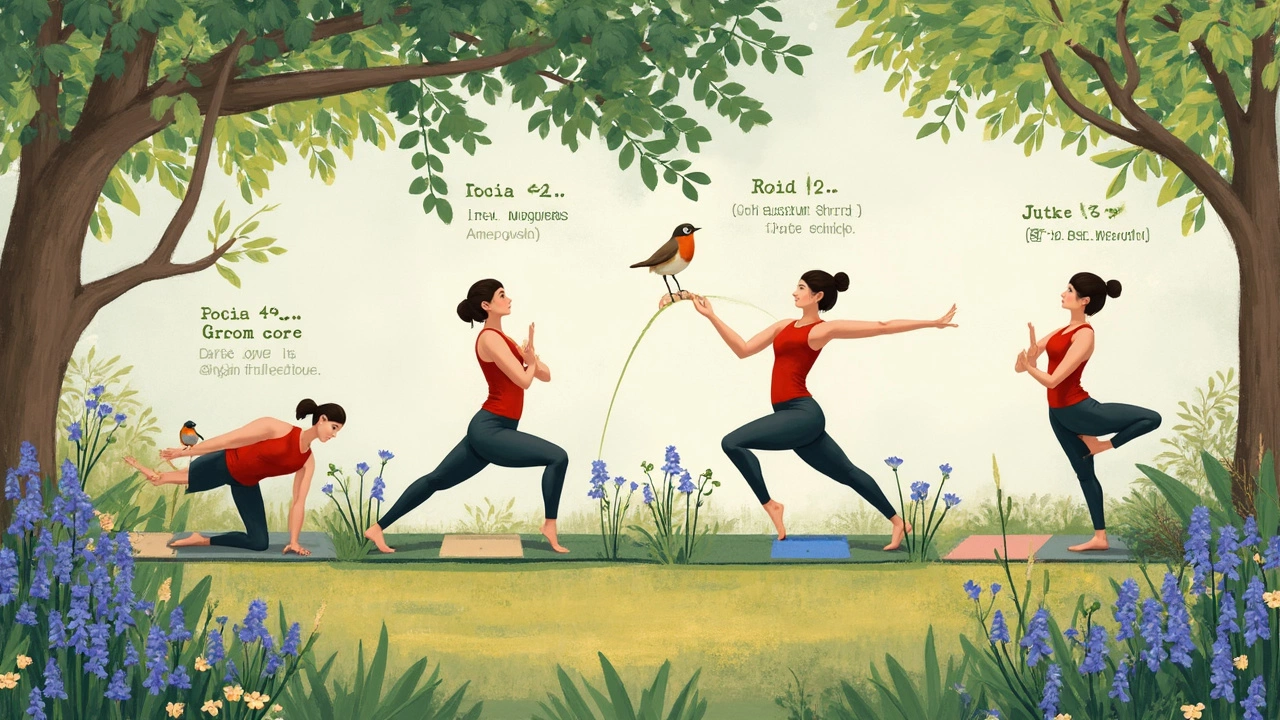
Wondering when you'll see results from your yoga practice? You're not alone! Many new yogis ponder the same question. While there's no one-size-fits-all answer, we've got some insights to share.
Imagine this: after your first few sessions, you might notice some immediate, albeit subtle, changes. Maybe your mind feels a bit calmer, or you're less sluggish than usual. That's the start! But hold your horses, as real, tangible results take a little more time.
On average, physical changes like improved strength and flexibility emerge after a couple of weeks, especially if you're practicing consistently. Mental and emotional benefits, like reduced stress and better focus, can sneak up on you just as quickly—or slowly—depending on your lifestyle and mindset.
Of course, how fast you see results depends on various factors, like how often you practice and your body's unique response to yoga. Don't forget, everyone's different! So before you start comparing your journey to others, remember that patience is key. Let's explore what kind of changes you can expect and how to potentially speed up your progress.
So you've rolled out your yoga mat and completed your first class. What's next? Let's talk about what you might start noticing in these early days of your yoga practice.
Right after your first few sessions, you might feel some muscle soreness. This is completely normal as your body is adjusting to new movements and stretches. Your muscles may feel more engaged and alive, but this initial discomfort will fade as you continue practicing.
One pleasant surprise for many new yogis is an unexpected mood boost. Thanks to the deep breathing and mindfulness involved, your stress levels can decrease almost immediately. Studies have shown that yoga can boost serotonin levels, making you feel happier!
It's crucial to set a routine early on. Aim for at least two to three sessions a week. Consistency is key if you want to see more pronounced yoga results. Whether you attend classes or practice online, carve out dedicated time from your schedule.
A fun way to track your progress is keeping a yoga journal. Jot down how you felt after each session. Over time, you'll look back and see just how far you've come.
Yoga beginners often get excited about these early signs, and rightly so! Remember, these changes are just the start. Keep practicing, and the results will only get better with time.
Alright, let’s talk about the juicy stuff: how yoga physically transforms you, specifically in terms of strength and flexibility. If you’re looking to touch your toes or beef up your core, yoga might just become your new best friend.
You might think yoga’s all about relaxing and chilling out, but it's a sneaky workout too. Holding poses like Plank or Warrior not only gets your muscles talking but also builds serious strength. Over time, as you master these poses and progress to more advanced ones, your muscles adapt, making you stronger.
Consistent practice, say about 3-4 times a week, can lead to noticeable strength improvement within a month. The key is sticking with it and gradually challenging yourself with tougher poses. Remember, everyone’s strength gains will look different, and that’s perfectly okay!
The holy grail for many who start yoga is enhanced flexibility. You might notice tighter hamstrings, shoulders, or back in the beginning, especially if you’ve been mostly sedentary. However, within a few weeks of consistent practice, expect to see those tight areas loosen up. Your downward-facing dog will feel more like a stretch and less like a struggle.
Yoga’s all about lengthening and stretching, and it’s super effective at it. Moves like Forward Bends and Cat-Cow stretches are perfect for increasing flexibility. And the best part? Flexibility improves every time you step on the mat, so keep at it!
Here's a little nugget of wisdom: a study found that people practicing yoga regularly report greater flexibility and muscle tone compared to those who don't. So if you want results, roll out that mat and get moving!

Yoga isn't just about touch-your-toes flexibility; it's also a powerful tool for the mind, offering some unexpected yoga benefits. When you consistently practice, you're likely to experience some profound mental and emotional changes.
One of the first things people often notice is a sense of calm. Regular yoga practice has been shown to reduce stress levels by lowering cortisol, the stress hormone. After just a few sessions, you might find it easier to cope with life's little and big hurdles. For instance, a study from Harvard Medical School emphasizes that
Alright, let's get into what makes seeing yoga results different for everyone. Whether you're shaking in a downward dog or floating through a warrior pose, several personal factors will influence your journey.
Consistency is your best friend here. Frequent practice accelerates progress, no doubt. If you hit the mat a few times a week, you'll likely notice changes sooner than if your yoga endeavors are more like monthly accidental meetings. Make it a routine, and watch the magic happen!
Ever notice how some folks seem naturally flexible and strong? Your starting fitness level plays a big role. If you're already in good shape, the improvements might come quicker. But don’t worry if you’re starting from scratch. Progress is progress, no matter the pace.
Age and body type aren't just numbers—they influence how quickly you see results. Generally, younger bodies tend to adapt faster, but every body type comes with unique strengths. Embrace what you've got and let yoga enhance it.
Your dietary habits and lifestyle choices can't be ignored. A balanced diet with plenty of hydration can work wonders alongside your yoga practice. Same goes for your sleeping habits—quality rest can really boost both your energy and results.
Never underestimate the power of your mind. A positive, open mindset can make all the difference. Being patient and kind to yourself, especially in the beginning, can be the secret sauce to seeing those yoga benefits flourish.
And hey, sometimes it's about that first step rather than the finish line. Embrace your personal journey with yoga—it’s unique to you, and that makes it extra special.

Want to get the most out of your yoga practice? Here are some practical tips that'll help you see those yoga results faster and keep your energy up.
The key to progress in yoga is consistency. Aim to practice at least 3 to 5 times a week. Having a regular schedule makes it a habit and helps you build strength and flexibility sooner.
Trying different styles of yoga can prevent boredom and target different areas of the body. For strength, go for power yoga. To boost relaxation, opt for yin or restorative yoga. Mixing it up can make your sessions more engaging and rewarding.
Breath and movement go hand in hand in yoga. Keep your breathing steady and controlled, as it improves your focus and helps you stay in poses longer. Proper breathing is essential for reaping the mental and emotional benefits too.
Whether it's touching your toes or holding a plank for a minute, setting achievable goals helps track your progress. Celebrate small wins to keep yourself motivated and patient.
Yoga isn't about pushing to the limits but understanding what your body needs. If something feels wrong, ease up. Modified poses or rest days are perfectly okay. In fact, they help prevent injuries and provide effective recovery.
Drinking water before and after yoga keeps you hydrated and ready for your next session. Add some whole grains, veggies, and proteins to your diet to fuel your body and improve energy levels.
Consider keeping a yoga diary or using an app to note down how you feel before and after practice. Reflecting on your journey helps you realize improvements in yoga benefits you're experiencing.
It's all about patience and persistence. Not all changes are visible immediately, but sticking with these tips can make a big difference in your experience and the results you see.